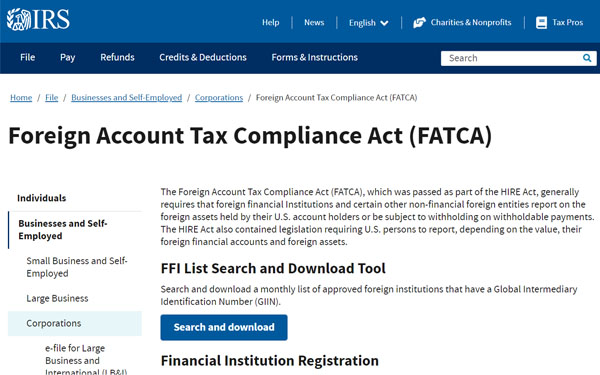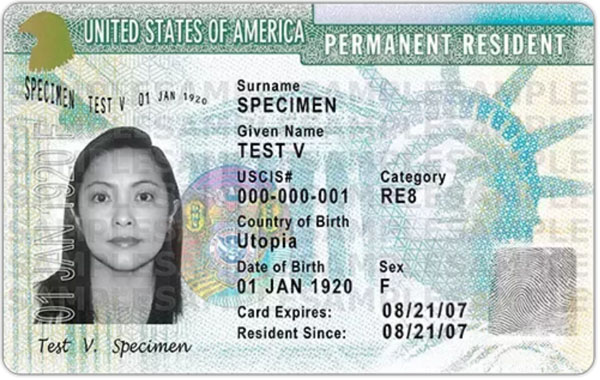
When you apply for a financial product, you will be asked about FATCA (Foreign Account Tax Compliance Act) in every country. Including opening a bank account, securities account, or purchasing insurance, you will always be asked if you are a US citizen.
The reason for this is that of FATCA of the US. In short, Americans are not allowed to purchase foreign financial products.
FATCA is a system created by the US to prevent tax evasion. However, in reality, it is a system designed to prevent Americans from transferring their assets in the US to other countries. This system is full of disadvantages for Americans because it prevents them from purchasing excellent financial products outside the US.
So, how does FATCA work? And is it possible to avoid FATCA? In this section, I will explain about FATCA, which is important for Americans when purchasing financial products or opening accounts.
Table of Contents
Americans Cannot Buy Foreign Financial Instruments
All US citizens are not allowed to purchase foreign financial products. If an American tries to open an account at a foreign brokerage firm or purchase life insurance at an offshore insurance company, he or she will be refused. The reason for this is FATCA.
The law that came into effect in 2010 is FATCA (Foreign Account Tax Compliance Act). FATCA was introduced in response to the fact that UBS, a Swiss international financial institution, was found to be moving American assets overseas and avoiding taxes.

Switzerland is known as a tax haven with low taxes. There are many investment products in these tax havens that are better than those in the United States.
For this reason, Americans used to actively use offshore investments. Although they would still have to pay taxes in the US, it was more efficient to invest their money in tax-free areas.
However, FATCA does not allow Americans to purchase mutual funds or life insurance policies sold in tax havens.
Even Opening a Bank Account is Difficult for American Nationals
This is not the only negative impact. It has become more difficult for Americans to even open a bank account overseas.
There are several countries that accept non-resident aliens to open bank accounts. Even in those countries, Americans are not allowed to open bank accounts. All banks in the world are subject to FATCA, so they refuse to open bank accounts for Americans.
According to FATCA, if a financial institution has American clients, it has to report the assets and transactions of the American to the Internal Revenue Service (IRS). This is why financial institutions find it troublesome and refuse to accept American clients.
To be more precise, some banks, securities companies, and insurance companies may accept Americans. However, it is important to consider that most financial institutions will not accept Americans to open bank or securities accounts.

So what should Americans who do not live in the US do? In this case, they have to use the few local financial institutions that accept Americans.
In the case of banks, there are a few banks that accept Americans. On the other hand, in the case of securities companies and insurance companies, the probability of accepting Americans is low, depending on the company’s policy.
FATCA Is a System to Prevent Tax Evasion and Outflow of Funds from the US
The reason why FATCA exists is to prevent tax evasion and the outflow of funds from the United States. If the information on the accounts of US persons in the world can be grasped, tax evasion by US persons can be prevented.
Also, if financial institutions around the world refuse to open accounts for Americans, Americans will only be able to use financial institutions in the United States. This would prevent the US dollar from flowing out of the US. Therefore, the USA will be able to keep its money only in the United States.
In fact, if an American tries to buy a financial product in a tax haven through an offshore investment, there is a 100% chance that the investment will be rejected. Since FATCA was enacted, Americans are not allowed to invest offshore. Since they can only purchase financial products in the US, there will be no outflow of US dollars.
-It Is Annoying for Business People Working Abroad
If someone lives in the US and does not invest overseas, FATCA is not relevant. On the other hand, it is a big problem for business people who are active in foreign countries.
For Americans, it is difficult to open bank or securities accounts in the country where they currently live. Also, funds cannot be transferred freely. It is also difficult to buy life insurance in the country where they live. Other than that, as mentioned above, offshore investments are definitely rejected.
FATCA was created to prevent an outflow of assets by the wealthy. For US citizen business people, however, FATCA is troublesome.
All the Banks in the World are Accepting the US Demands
What is important is the fact that banks all over the world are accepting the US demand. FATCA is an American law and has nothing to do with international law. Even though there is no need to follow US law, all financial institutions are following the FATCA.
This is because the USA issues the US dollar, and the US dollar is the world’s key currency.
What would happen if the USA banned the trading of US dollars because of violating FATCA? That financial institution would certainly go bankrupt. It is of utmost importance for all financial institutions, including banks, securities companies, and insurance companies, to pay and receive money in US dollars.
Except for a few countries that are under financial sanctions from the US and cannot handle US dollars, all other countries are required to comply with FATCA. This is the reason why financial institutions all over the world are complying with FATCA.
The United States Does Not Have Tax Treaties with Other Countries
It is common for all countries to want to keep track of their citizens’ overseas assets and prevent tax evasion. Therefore, many countries have tax treaties with each other.
The exchange of information regarding tax treaties is called CRS, and it allows tax authorities to check account information between countries that have concluded CRS, even if the assets are overseas.
For example, suppose a Japanese resident in Japan sends money to Singapore and invests it to increase his money, but does not report it to the tax office in Japan. In this case, it is easy to get caught. Since Japan and Singapore have a tax treaty, the Japanese tax office can easily access the information of the Japanese person’s account even if it is in a foreign country.
On the other hand, the US does not have a tax treaty with any other country. The US argument is that since the USA has FATCA, there is no need to conclude CRS.
But we notice that this is illogical because FATCA is a system to prevent Americans from evading taxes and outflowing funds.
In the case of the US, FATCA prevents Americans from evading taxes and outflowing funds. On the other hand, since the US does not have CRS with other countries, the US does not have to give out account information to other countries even if people use US banks or securities companies to evade taxes or engage in money laundering.
The United States does not allow Americans to evade taxes, but it tacitly accepts people from other countries to send money to the US to evade taxes. Since the US does not have CRS with other countries, tax evasion and money laundering by foreigners using US financial institutions are frequent.
However, for the United States, even if the money is tax evasion funds, it brings money into America, which improves the American economy. Normally, this would not be allowed, but since the US is the most influential country in the world, this attitude is allowed.
Green Card Holders and US Residents Are Subject to FATCA
Who is subject to FATCA? The following people fall under this category.
- US citizens
- Green Card holders
- People who live in the US

This includes not only US citizens and green card holders but also those who are currently living in the US. In other words, anyone who is even slightly involved in US residency is subject to FATCA.
Of course, this also applies to corporations. Not only corporations incorporated in the USA, but also foreign corporations with US persons as major shareholders are subject to FATCA.
Is It Impossible for US Residents to Invest Offshore?
Because of FATCA, US citizens cannot purchase foreign financial products. So what about those who are residents of the US but are not US citizens? Can they use offshore investment?
This is not recommended, but it is possible depending on how you do it. You can pretend that you are living in a country other than the United States.
If you do not have a US passport, you probably have identification documents and banking information from another country. You can use these documents to purchase financial products in foreign countries.
For example, if you want to buy an offshore investment product, you can present a non-US passport and submit a document that shows your non-US address when verifying your residential address. If you do this, you will be accepted.
Although this is not a recommended method, if you are a dual citizen or a non-US citizen, you can apply in this way.
Renouncing US Citizenship Can Avoid Over-Regulation
On the other hand, it is also possible to renounce US citizenship. In fact, the wealthier a person is, the more they tend to renounce their US citizenship. More and more people are renouncing their US citizenship in order to avoid strict regulations.
If you renounce your US citizenship, FATCA will no longer apply to you. As a result, you can invest in excellent financial products all over the world, and you will not be refused to open a bank account in a foreign country.
Among the celebrities, for example, the following people have renounced their US citizenship.
- Eduardo Saverin, one of the founders of Facebook: renounced US citizenship and became a Singaporean citizen.
- Tina Turner, singer: renounced US citizenship and became a Swiss citizen.
- Boris Johnson, Prime Minister of the UK: originally British, renounced US citizenship because of dual citizenship.
As you can see, many people have renounced their American citizenship. For those who can conduct business activities without living in the US, there is no advantage to having US citizenship. Rather, it is a disadvantage when working in a foreign country. Therefore, we can choose to renounce our US citizenship as a last resort.
Renouncing US Citizenship Also Eliminates Income Taxation in the US
By the way, renouncing your US citizenship will also allow you to avoid income taxation by the US. In general, if you live abroad, the taxation system of your home country is no longer relevant. For example, if a Japanese citizen moves to Singapore, the Singapore tax system will be applied instead of the Japanese tax system.
The Japanese tax system is irrelevant, and he is not liable to pay taxes to Japan. He only has to pay taxes to Singapore. It is common sense of the whole world that people living in a foreign country do not follow the taxation system of their home country.
However, there are some countries that do not follow this common sense. One of these is the United States. If you are an American, you are obligated to pay taxes in the United States, no matter where you live in the world. Even if you live in the UK or Singapore, you still have to pay taxes to the US.

This is the reason why Boris Johnson, the British Prime Minister, renounced his American citizenship. He used to be a dual citizen of the UK and the US. So when he sold his house in England, the IRS ordered him to pay $50,000 as capital gains tax.
Therefore, he renounced his US citizenship when he was a British Foreign Secretary.
For people who continue to live in the US, US citizenship is excellent. On the other hand, for those who live outside the US, US citizenship can only be harmful. Renunciation of US citizenship is a frequent practice among the wealthy, not only for the purpose of investing in superior financial products but also to avoid paying unnecessary taxes.
Understanding the FATCA System in the USA
With its large market size, we are able to access a wide variety of financial products in the United States. However, it is not possible to invest in excellent financial products outside the US. Also, it is difficult to open a bank account or securities account outside the US.
The reason for this is the existence of FATCA. Although it is an American law, all financial institutions in the world follow FATCA. Therefore, it is a very troublesome system for Americans living abroad.
If you are a non-US citizen, you can apply to open a bank account by saying that you do not live in the US. On the other hand, if you have only a US passport, you will not be able to use foreign financial institutions in most cases. In such cases, you can choose to renounce your US citizenship as a last resort.
For Americans, FATCA has to be taken into consideration when using foreign financial institutions. Therefore, please check in advance if the financial institution will accept Americans. Also, if you do not live in the US, consider renouncing your US citizenship.







